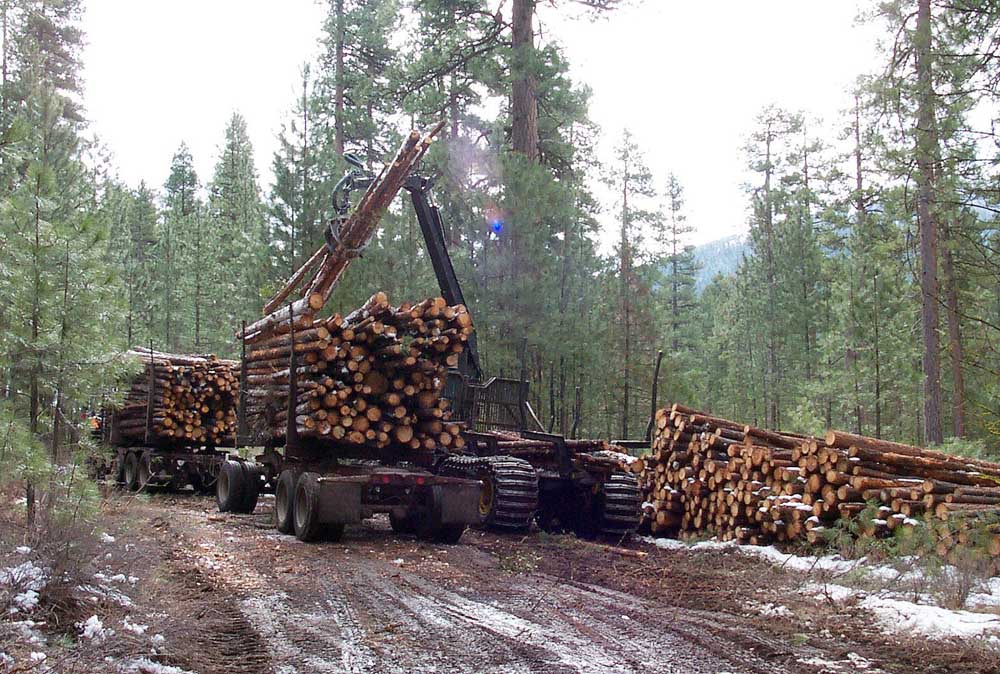Oregon counties oppose new timber tax despite revenue potential
Published 2:46 pm Thursday, March 4, 2021

- Logs are loaded onto trucks after a thinning operation. Oregon counties oppose a new severance tax on timber despite the potential to gain revenue.
Oregon’s county governments are opposing a proposed timber severance tax due to its economic impacts even though they’d stand to get money under the proposal.
Trending
Lawmakers are considering re-imposing a 5% severance tax on the value of harvested timber to replace the existing forest products privilege tax, which is currently 90 cents per thousand board-feet.
Legislative analysts haven’t yet calculated the financial impacts of House Bill 2379, which would impose the severance tax, but it’s expected to steeply increase revenues and taxes on logs.
Based on current log values, the new severance tax would amount to $25 per thousand board-feet of timber, compared to the current tax of about $4 per thousand board-feet — more than a six-fold increase, said Roger Beyer, lobbyist for the Oregon Small Woodlands Association.
Trending
The Association of Oregon Counties has come out against HB 2379, despite the potential for counties to receive 25% of the new tax revenues for wildfire and emergency preparedness.
Though county governments require tax dollars to provide crucial services, the need for revenues must be balanced against the economic prosperity of their communities, according to AOC.
Rural areas have already suffered from a downturn in tourism and hospitality due to the coronavirus pandemic, the group said in submitted testimony.
Meanwhile, the timber industry is adjusting to Oregon’s new corporate activity tax and is preparing for stricter regulations under a pending agreement with environmental groups and a state habitat conservation plan for protected species, according to AOC.
“As a result, the last thing our local governments need is for the state legislature to pass any new taxes on an industry that can continue to operate and provide much-needed family wage jobs with benefits to their residents during these difficult economic times,” the group said.
Recent hearings on the proposed timber tax overhaul were largely dominated by small woodland owners, who argued that HB 2379 would be financially devastating to their industry.
Critics said the bill would drive up expenses at a time they’re already contending with damage from wildfires and ice storms, as well as the steadily rising cost of logging.
The tax would be set at such a high rate that harvesting timber wouldn’t be economically viable, pressing landowners to convert their property to agricultural uses or residential development, according to critics.
“Rural Oregon cannot take any more punches to the gut. This tax only furthers the urban-rural divide that we are seeing ripping across our great state,” Ellie Hilger, a Tillamook County forestland owner.
“I thought the decades-old timber wars were coming to an end with last year’s memorandum of understanding between timber and environmentalists,” she said, referring to a deal to forestall ballot initiatives over logging rules. “The old battle lines are being redrawn, and once again, families like mine are in the crosshairs.”
Proponents of HB 2379 argue that severance taxes were once imposed on timber harvests in Oregon before getting replaced in the early 1990s, but they’re needed again to pay for firefighting costs and local government services.
Supporters also claim that Oregon’s timber taxes bring in roughly one-third as much revenue as in Washington, even though that state harvests half as much timber.
Private timberland owners represent 77% of the acreage protected by the Oregon Department of Forestry but only pay 22% of the state’s firefighting costs, said Rep. Paul Holvey, D-Eugene, the bill’s chief sponsor.
Holvey said he tried working with county governments on the severance tax but said they’re opposed to the proposal due to fears of “crossing” the timber industry, on which they’re economically dependent.
“It seems counterproductive to reject that outright,” Holvey said of the tax dollars counties could receive.
As for “mom and pop” forestland owners, Holvey attributed their opposition to “talking points” from the Oregon Forest & Industries Council, a timber group, and the Oregon Forest Resources Institute, an industry-funded education organization.
“They rely on OFIC and OFRI for their messaging,” he said.
Long before the recent wildfire and ice storm damage, the timber industry has claimed it’s not appropriate to consider additional taxes on logs, Holvey said. “It will never be the right time for someone to be taxed, if you’re the one getting taxed.”
“The last thing our local governments need is for the state legislature to pass any new taxes on an industry that can continue to operate and provide much-needed family wage jobs with benefits to their residents during these difficult economic times.”
—Association of Oregon Counties









